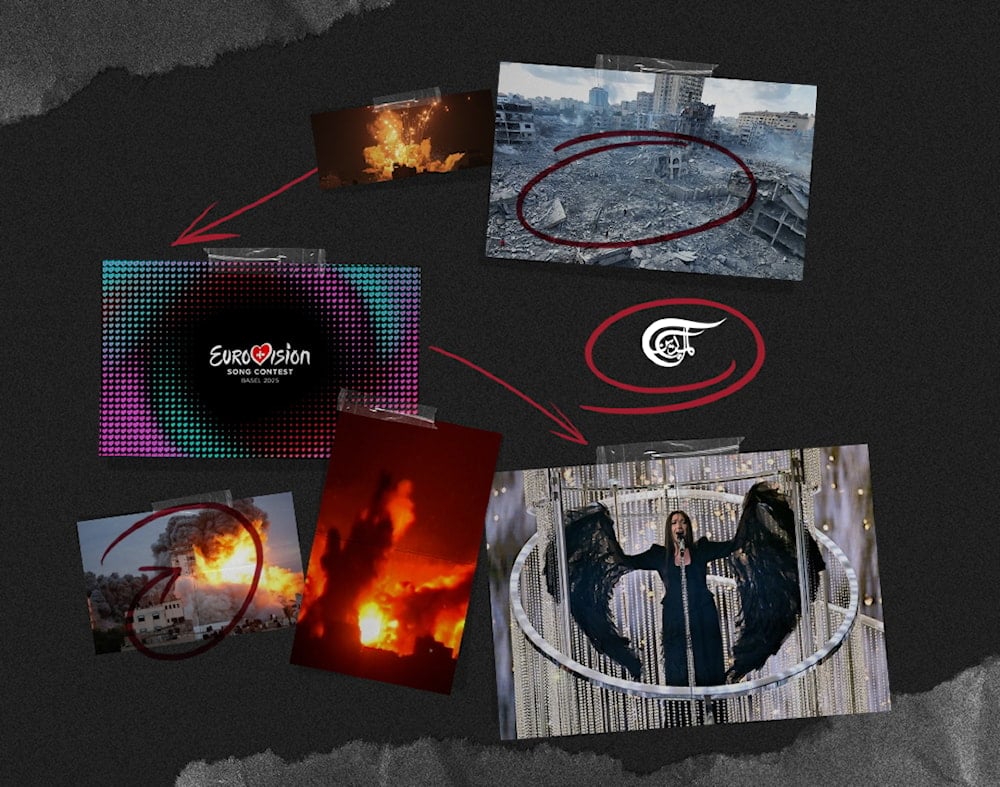Eurovision: NATO Psychological Warfare Tool
Eurovision 2025 was rocked by controversy as "Israel" faced rigging allegations and backlash over its near-win amid global calls for its disqualification.
-

That the Zionist entity has so consistently invested enormous time, energy, and money into attempting to ‘game’ Eurovision over so many years is a testament to its redoubtable international propaganda potency (Illustrated by Ali al-Hadi Chmeis to Al Mayadeen English)
The 2025 Eurovision Song Contest ended May 17th mired in controversy. The Zionist entity’s entrant, Yuval Raphael, finished second. Her performance, “New Day Will Rise”, received 297 points via public televote - the highest garnered by any act in the competition’s Grand Final, with 13 countries giving Raphael the maximum score of 12 points. This helped "Israel" almost clinch victory, despite coming last among participants in national jury votes. Immediately, state broadcasters across Europe demanded an investigation into flagrant, industrial scale rigging in "Israel’s" favour.
The Zionist entity’s participation in the Contest was the subject of much controversy in its leadup. On May 5th, 72 former Eurovision contestants - including previous winners - cosigned a letter to the European Broadcasting Union (EBU) demanding "Israel" and its national broadcaster be banned from the contest, over the country’s “genocide against the Palestinians in Gaza and the decades-long regime of apartheid and military occupation against the entire Palestinian people”. Their call was echoed by Spanish premier Pedro Sanchez.
Then, on May 19th, an EBU probe revealed the Israeli Government Advertising Agency conducted a vast, cross-platform online campaign to encourage support for Raphael’s entry. Detailed instructions on how to vote for her via text and phone in countries as far afield as Australia were widely circulated, along with a reminder that individuals could vote up to 20 times each. A dedicated YouTube channel - @Vote4NewDayWillRise - was launched to support the effort, garnering over 8.3 million views. Its videos were widely amplified across social media.
Separate investigations suggest Zionists could’ve further connived to fudge the Contest’s results via “VPNs, automated scripts (bot farms), and bulk SIM card purchases”. It is not the first time Tel Aviv has engaged in brazen fraud to skew Eurovision’s results in its favour. When "Israel" triumphed in the 2018 Contest, speculation widely abounded their victory resulted from meddling by now-defunct online Zionist astroturf effort Act.IL. On top of unambiguous voting irregularities, winning meant the 2019 Contest would be convened in "Israel".
A June 2018 Knesset hearing spelled out this windfall’s strategic significance. Multiple Zionist entity lawmakers and ministers spoke of how “holding the Eurovision song contest in "Israel" is a gift” that could be exploited to boost and improve "Israel’s" international image, and counteract the burgeoning Boycott, Divestment and Sanctions movement’s successes. BDS had recently compelled Argentina to cancel a World Cup ‘friendly’ match with the entity, after Tel Aviv attempted to host the bout in illegally occupied al-Quds.
‘Opinion Leaders’
Similar Zionist entity-orchestrated social media and televote chicanery boosted "Israel" to fifth place in the 2024 Contest, which was likewise prefaced by widespread calls to bar Tel Aviv’s participation, and for other participating countries to boycott the event. While falling far short of victory, the public relations utility of "Israel’s" performance was abundantly clear. Entity officials, Western news outlets and pundits eagerly leaped upon the results as proof that despite the ongoing 21st century Holocaust in Gaza, a “silent majority” of Europeans still supported "Israel".
At the time, journeyman Israeli government “public diplomacy” apparatchik David Saranga gushed to Ynet, “we knew that the situation was less serious than it is reflected in the demonstrations on the streets of Europe, but we did not expect such overwhelming support”. He added, “the fact that even countries where public opinion is critical of "Israel", such as Sweden or Ireland, gave "Israel" a high score” indicated there were “underground currents” of pro-Zionist sentiment throughout the West.
However, Saranga also admitted the entity’s Foreign Ministry “acted among friendly audiences to increase voting”. Ynet subsequently detailed this effort, which included Tel Aviv’s entrant that year, Eden Golan, recording personal video addresses to foreign audiences in their own languages, referencing a supposed “wave of hatred” being whipped up against "Israel" by “Muslims”. Extensive analysis was conducted to ensure her message reached “Eurovision-loving audiences such as the LGBT community in Europe, members of fan clubs, journalists covering the contest and opinion leaders in the field.”
Following Yuval Raphael coming second this year, a familiar chorus erupted, with numerous prominent figures claiming her televoting preeminence was indicative of concealed Zionist sentiment the world over, and that ever-growing Palestine solidarity actions were not representative of wider public opinion. This is despite her performances being met with such intense booing, some European broadcasters resorted to piping in pre-recorded cheers and applause to drown out the mass jeering. Meanwhile, polls amply indicate the overwhelming majority of Europeans hold “unfavourable” views of Tel Aviv.
That the Zionist entity has so consistently invested enormous time, energy, and money into attempting to ‘game’ Eurovision over so many years is a testament to its redoubtable international propaganda potency. Up to 200 million people worldwide routinely tune in to the tournament every year, and Tel Aviv is not alone in seeking to weaponise the tournament for political reasons. In fact, Eurovision was secretly created as a psychological warfare tool by NATO to manipulate and control public opinion for this explicit purpose.
‘Psychological Action’
In January 2015, an extraordinary, hitherto secret document drawn up by NATO’s Committee on Information and Cultural Relations in March 1955 was published for the first time. It outlined the practical and ideological foundations of Eurovision, which was first convened next year, with just seven participants. A section of “aims” of the Contest states NATO’s objective was to “make the most” of TV, which “gives mankind at long last, the possibility, through the visual image, of conquering time and distance”, reaching vast global audiences simultaneously:
“Television has enabled sight to triumph over time and space, and this is the aspect which struck us most forcibly and led us to believe that it was our duty to break through the narrow boundaries which confined our programmes to spectators clustered around our respective capital cities, and to travel the world. There is no point in having a wonderful instrument in our hands if all we are going to do…is show the suburbs of Paris, London or Milan in France, England or Italy.”
The document went on to state “the thrill” of TV “lies in ranging as far afield as possible…[using] this marvellous instrument’s capacity for the instantaneous transmission of an event taking place elsewhere.” NATO contended “television transcends the frontiers of our European countries,” and thus the military alliance “held within [its] grasp a unique instrument for social and psychological action”. In sum, a “nervous system” of Europe could be constructed, “far more powerful than the telephone” or radio, to “animate the…general public.”
The document concludes with its author, Jean d’Arcy, then-senior director of French state broadcaster Radiodiffusion Française, expressing his sincere hope that the “social significance of Eurovision will become ever more apparent as it progresses along the lines which…it is destined to follow”. The file was a summary of remarks he made at a dedicated NATO conference “of senior information officials” in Paris two months earlier. His talk was described in a subsequent alliance newsletter as “most interesting”.
At that conference, Hastings Ismay, NATO’s first secretary general - who notoriously declared the alliance’s purpose was “to keep the Russians out, the Americans in, and the Germans down” across Europe - “reiterated his steadfast conviction of the importance of a profounder and more widespread understanding of NATO’s aims and achievements”. Eurovision provided an ideal opportunity to insidiously achieve those goals in a non-military context, propounding European unity and cultural superiority over the Soviet Union while the Cold War was in its infancy.
The collapse of Communism in Central and Eastern Europe, and the Soviet Union’s subsequent dissolution, vastly increased Eurovision’s pool of contestants. It was not until 1994 that Russia first appeared at the Contest. On February 25th 2022, one day after the Ukraine proxy war erupted, Moscow was banned from participating, which has remained in place ever since. In that year’s competition, Kiev prevailed, with The Kalush Orchestra’s song “Stefania” - interpreted in some quarters as an ode to Ukrainian ultranationalist mass-murderer Stepan Bandera - securing first place.
NATO deputy secretary general Mircea Geoana praised Ukraine’s victory and its “beautiful song”, linking Kiev’s triumph “to its bravery in fighting Russia”, and “immense public support all over Europe and Australia” for the proxy war. A Reuters report on Geoana’s comments commenced by declaring, “Eurovision and NATO might not usually be associated” - the international newswire’s writers apparently unaware that the military alliance was from inception, and remains, absolutely fundamental to the international tournament’s operation.

 Kit Klarenberg
Kit Klarenberg
 8 Min Read
8 Min Read











